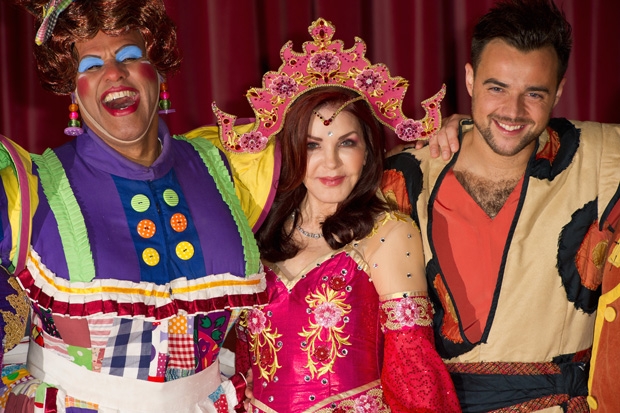Before the start of Aladdin in Milton Keynes this week a promotional video showed Brian Blessed in oriental costume bellowing to the audience that pantomime had never been so popular in its long history and that Britain was still full of people longing to shout ‘He’s behind you!’, ‘Oh, yes it is!’, ‘Oh, no it isn’t!’, or whatever. It was a Sunday afternoon matinée and the theatre was full. The same had been true the week before at Cinderella in Northampton. The evidence seemed to suggest that Brian Blessed was right. But I did find myself wondering why.
The pantomime may still be able to fill provincial theatres, but as entertainment it has deteriorated steadily over the years. Many of its traditional features still survive — the cross-dressing, the risqué sexual innuendoes, the audience participation. But others have not. While the ‘pantomime dame’, always played by a man, remains a guaranteed feature (Widow Twankey in Aladdin, the Ugly Sisters in Cinderella), the ‘principal boy’, played by a girl in breeches, has vanished. The male hero is now a conventional, good-looking man. (Modern audiences, it seems, are happy about men playing women, but are embarrassed by women playing men, especially when they are courting another woman.)
There are other interesting survivals, such as the tradition that the ‘good fairy’ always enters from stage right and the ‘villain’ from stage left, a convention going back to medieval mystery plays in which the right side of the stage symbolised Heaven and the left side Hell. But what has happened to the ‘transformation scene’, once the most magical feature of the pantomime, in which the characters and scenery would change before one’s eyes in an elaborate piece of theatrical wizardry? That has gone, as has any episode of calm, mystery or romance.
More than 40 years ago now, I went to see Twiggy play Cinderella in a Christmas pantomime in London. ‘I want this to be an old-fashioned pantomime,’ she had said. ‘I don’t want any dirty jokes. You don’t need them. Cinderella is the greatest story there has ever been.’ And so it turned out. When Twiggy looked up from the stage with her wide innocent eyes and sang the old music-hall number ‘The boy I love is up in the gallery’, while seemingly gazing at just such a person, tears filled my eyes. Such an experience would be unimaginable in a pantomime today, where you are battered relentlessly by noise.
The modern pantomime is a feast of frantic dancing and hideously amplified modern pop music almost without respite. It even comes as a relief when, towards the end, some little children are invited up on stage to be interviewed about their Christmases and to sing, albeit tunelessly, ‘Old Macdonald had a farm’. At least that is a song one can recognise.
Another problem for an old fogey like me is recognising the ‘celebrities’ that the producers insist on recruiting as stars to bring in the crowds. I am sure that John Partridge, the prince in Northampton’s Cinderella, is incredibly famous — he has acted in EastEnders on television — but if you don’t watch television a lot, then most of what you see and hear in pantomime is now lost on you.
However, the star of Aladdin in Milton Keynes was somebody I did know about. It was Priscilla Presley, no less; the 70-year-old widow of Elvis Presley, who played Aladdin’s genie, appearing from stage right to grant the hero’s wishes whenever he rubbed his magic lamp. Mrs Presley is a mediocre actress who once appeared in the TV series Dallas, but she is above all rich and hardly in need of a part in a pantomime in Milton Keynes.
The Milton Keynes Theatre, however, has spooky drawing power. Six years ago I went to another pantomime there — Cinderella that time — in which the part of the girl’s father, Baron Hardup, was played by the late Mickey Rooney, then aged 89. He could barely walk and seemed to fall asleep whenever he sat down, so what made him do it? He was a genuine Hollywood legend, who had had eight wives (Ava Gardner being his first) and a famous film partnership with Judy Garland. What kind of comedown was this?
A glance at his website showed that he simply could not bear to be offstage, even at his great age, and that Milton Keynes was clearly better than nothing. His ‘personal motto’ on his website was ‘Don’t retire! Inspire!’, and it seemed that Milton Keynes was the only place left in the universe where he was still welcome to appear. And perhaps that could be true of Mrs Presley, too.






Comments